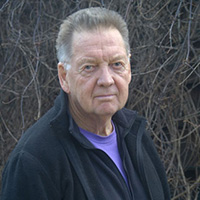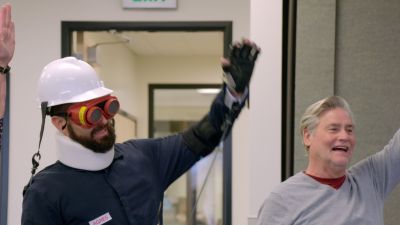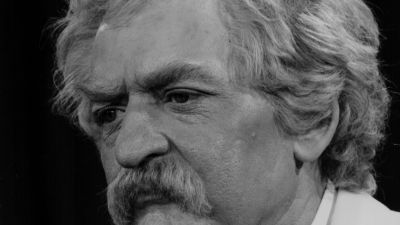April is National Poetry Month, and we’re celebrating by featuring examples of “civic” poetry from new and familiar voices. Throughout the month we’ll be discussing what it means to be civic through the art of words. Join us on Twitter at #civicpoetry.
I find myself often drawn to William Stafford’s observation that “a poem is anything said in such a way or written in such a way as to attract a certain kind of attention.”
I like the dynamic core of this definition: We recognize something as poetry by how we experience it, by whether or not it elicits in us “a certain kind of attention.” I also like the open-endedness of “a certain kind,” with the implication that we will know that certain kind of attention when we feel it. How reassuring and how completely qualifying! As if poetry were made for us, or we for it. Looked at this way, poetry may be so integral to human experience that it might even be, in some essential way, who we are.
For example, consider these often-quoted lines from William Carlos Williams’ “Asphodel, That Greeny Flower”:
My heart rouses
thinking to bring you news
of something
that concerns you
and concerns many men. Look at
what passes for the new.
You will not find it there but in
despised poems.
It is difficult
to get the news from poems
yet men die miserably every day
for lack
of what is found there.
The aliveness of poetry seems more than kin to the aliveness that is us. Always changing and always in motion, we (in our essence) and it are what Williams refers to as “the new,” which is always somehow in relation both to what is past and to what is about to be. The ability to respond to this relationship and to keep it truly alive might be what sustains us.
A key feature of poetry may lie in its positing, its exploring, and its manipulating of relationships (including, of course, those suggested through metaphor). Awareness of the endless and endlessly changing sets of relationships that constitute what we might call reality may be an important part “of what is found there,” the lack of which causes men to die miserably every day. It is as if, and this should come as no surprise, we are profoundly nourished by our awareness of the web of relationships within which we exist and, in particular, by our experience of the relationships that define us and that constitute such a large part of what we think of as our personal lives.
If poetry is, at its core, involved with suggesting and considering all manner of relationships, including relationships among humans, there seems some justification for seeing all poetry as civic poetry (if only we could absorb the full range of implications poetry makes available to us). Still, when we talk about civic poetry we seem to yearn for something more specifically focused on what we might call public life and our relation to it.
While it would be interesting, and useful, to look at a broad range of poems to consider the ways in which they might have civic implications (and I think we would be surprised at what we found through this examination), here are two poems that I think obviously qualify as civic poems: Gerald Stern’s “Ich Bin Jude,” and Taha Muhammad Ali’s “Abd-el-Hadi Fights a Superpower.”
Ich Bin Jude
Who was it threatened to murder
a streetcar full of fucking Nazis in Wien
when he was in the country only two hours
and watched the car empty
including the festooned conductor and the decorated motorman?
The rain wouldn’t stop.
The cheapest place in Europe
September, October, November, 1954.
Your darling city.
Abd-el-Hadi Fights a Superpower
In his life
he neither wrote nor read.
In his life he
didn’t cut down a single tree,
didn’t slit the throat
of a single calf.
In his life he did not speak
of the New York Times
behind its back,
didn’t raise
his voice to a soul
except in his saying:
“Come in, please,
by God, you can’t refuse.”
Nevertheless —
his case is hopeless,
his situation
desperate.
His God-given rights are a grain of salt
tossed into the sea.
Ladies and gentlemen of the jury:
about his enemies
my client knows not a thing.
And I can assure you,
were he to encounter
the entire crew
of the aircraft carrier Enterprise,
he’d serve them eggs
sunny-side up,
and labneh
fresh from the bag.
(Translated by Peter Cole, Yahya Hijazi and Gabriel Levin)
Part of what most strikes me about these two poems is their focus on extreme relationships: an individual set against a culture, even a nation.
In Gerald Stern’s poem the speaker enters an obscene and unspeakably hideous history, still fresh but denied. And this denial may be particularly deep here in Vienna (referred to in the poem by its German name), the city of elegance and grace, as suggested in the elaborately dignified formal attire of the conductor and the motorman. The title is a declaration (in the language of those still in power and responsible for that history) that the speaker is a Jew and, therefore (in the eyes of those in power) valueless. The speaker’s murderous outburst may at first shock us and certainly shocks those around him as more than uncivilized. But how can the reality of the Holocaust be contained within any civilization? And how can the speaker’s response be anything but appropriate and perhaps the only way to begin to signal the depth of barbarousness that was the Holocaust? Weren’t the attitudes that fueled the Holocaust and the event itself complete denials of anything that could be properly regarded as civilized?
Taha Muhammad Ali’s poem pits a simple Arabic everyman against a superpower. A hopeless, indeed a ridiculous confrontation between Abd-el-Hadi and the aircraft carrier Enterprise is brought somehow into focus when Abd-el-Hadi offers up the only thing he has at his disposal: hospitality. What were his other options? What else was he prepared to do? What else was he capable of doing? Central to his strategy, if it can be called that, is his determination to deal individually with the entire crew of the Enterprise. To serve them, individually, “eggs sunny-side up/ and labneh/ fresh from the bag.”
While “Ich Bin Jude” is trapped within a history that cannot be changed, “Abd-el-Hadi Fights a Superpower” anticipates a history still to be made. Additionally, while the speaker of “Ich Bin Jude” finds himself physically surrounded by a group of people associated with the hideous past that so consumes him, Abd-el-Hadi at least theoretically has the option of encountering his apparent enemy one by one. So among the many questions offered to us with these two poems are these: how does the history and immediate situation of “Ich Bin Jude” affect our understanding of “Abd-el-Hadi Fights a Superpower” and how does the anticipated personal civility of “Abd-el-Hadi Fights a Superpower” illuminate the circumstances of “Ich Bin Jude.”
I cannot conclude this little discussion of poetry and relationships without reaching out to another remarkable poem by Taha Muhammad Ali that bears directly on the question of relationships and civic poetry. Here is his poem called, simply, “Revenge.”
Revenge
At times … I wish
I could meet in a duel
the man who killed my father and razed our home, expelling me
into
a narrow country.
And if he killed me,
I’d rest at last,
and if I were ready —
I would take my revenge!
*
But if it came to light, when my rival appeared, that he had a mother waiting for him,
or a father who’d put
his right hand over
the heart’s place in his chest whenever his son was late even by just a quarter-hour for a meeting they’d
set— then I would not kill him, even if I could.
*
Likewise … I
would not murder him
if it were soon made clear
that he had a brother or sisters
who loved him and constantly longed to see him. Or if he had a wife to greet him
and children who
couldn’t bear his absence
and whom his gifts would thrill.
Or if he had
friends or companions,
neighbors he knew
or allies from prison
or a hospital room,
or classmates from his school … asking about him
and sending him regards.
*
But if he turned
out to be on his own—
cut off like a branch from a tree — without a mother or father,
with neither a brother nor sister, wifeless, without a child,
and without kin or neighbors or friends, colleagues or companions,
then I’d add not a thing to his pain within that aloneness—
not the torment of death,
and not the sorrow of passing away. Instead I’d be content
to ignore him when I passed him by
on the street — as I
convinced myself
that paying him no attention
in itself was a kind of revenge.
Nazareth April 15, 2006
(Translated by Peter Cole, Yahya Hijazi and Gabriel Levin)
This project was co-curated by the journalism nonprofit the Economic Hardship Reporting Project and its Puffin Story Innovation Fund.




